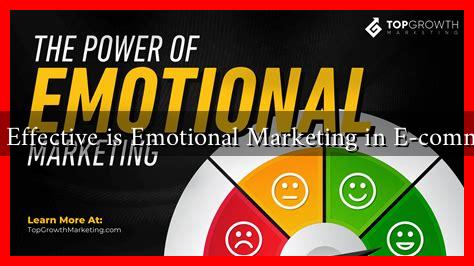-
Table of Contents
How Effective is Emotional Marketing in E-commerce?
In the fast-paced world of e-commerce, where competition is fierce and consumer attention spans are short, businesses are constantly seeking innovative ways to connect with their audience. One of the most powerful strategies that has emerged is emotional marketing. This approach taps into the feelings and emotions of consumers, creating a deeper connection that can lead to increased sales and brand loyalty. But how effective is emotional marketing in the realm of e-commerce? This article explores the impact of emotional marketing, supported by examples, case studies, and statistics.
The Power of Emotions in Consumer Behavior
Emotions play a crucial role in decision-making processes. According to a study by the American Marketing Association, emotional responses to advertisements can significantly influence consumer behavior. Here are some key insights:
- Emotional ads are more likely to be shared on social media, increasing brand visibility.
- Consumers are more likely to remember brands that evoke strong emotions.
- Emotional connections can lead to higher customer loyalty and repeat purchases.
In e-commerce, where physical interaction is limited, creating an emotional connection can be a game-changer. Brands that successfully evoke emotions can differentiate themselves from competitors and foster a loyal customer base.
Successful Examples of Emotional Marketing in E-commerce
Several e-commerce brands have effectively utilized emotional marketing to enhance their customer engagement and drive sales. Here are a few notable examples:
- Airbnb: The company’s “Belong Anywhere” campaign focuses on the emotional aspect of travel, emphasizing the feeling of belonging and connection. This approach has resonated with users, leading to increased bookings and brand loyalty.
- Always: The brand’s #LikeAGirl campaign aimed to empower young girls and challenge societal norms. By addressing a significant emotional issue, Always not only increased brand awareness but also fostered a strong community around its products.
- Warby Parker: This eyewear brand uses storytelling to connect with customers emotionally. Their “Buy a Pair, Give a Pair” initiative appeals to consumers’ desire to make a difference, enhancing their emotional connection to the brand.
Statistics Supporting Emotional Marketing
Numerous studies have highlighted the effectiveness of emotional marketing in driving consumer behavior. Here are some compelling statistics:
- According to a study by HubSpot, emotional marketing can increase conversion rates by up to 23%.
- A report from Forbes found that emotionally connected customers are 44% more likely to purchase again.
- Research by Nielsen indicates that ads with emotional appeal outperform those with rational appeal by a factor of 2 to 1.
Challenges of Implementing Emotional Marketing
While emotional marketing can be highly effective, it is not without its challenges. Brands must navigate the following hurdles:
- Authenticity: Consumers are increasingly savvy and can detect inauthentic emotional appeals. Brands must ensure their messaging aligns with their values.
- Target Audience: Understanding the emotional triggers of different demographics is crucial. What resonates with one group may not work for another.
- Balancing Emotion and Information: While emotions are powerful, consumers still seek information. Brands must strike a balance between emotional storytelling and providing essential product details.
Conclusion
Emotional marketing has proven to be a highly effective strategy in e-commerce, allowing brands to create meaningful connections with their customers. By tapping into the emotions of their audience, businesses can enhance brand loyalty, increase sales, and differentiate themselves in a crowded marketplace. However, it is essential for brands to approach emotional marketing authentically and strategically, ensuring that their messaging resonates with their target audience. As e-commerce continues to evolve, those who master the art of emotional marketing will likely lead the way in consumer engagement and brand success.


